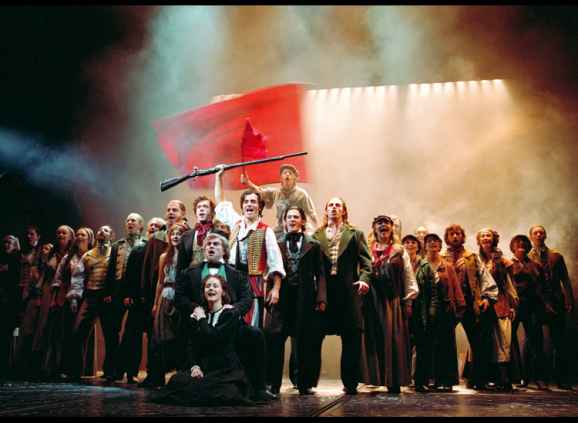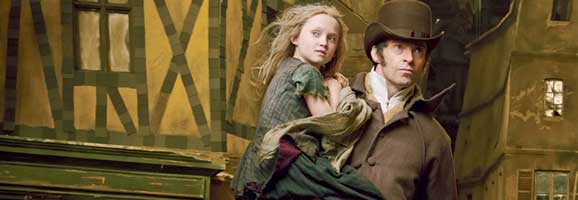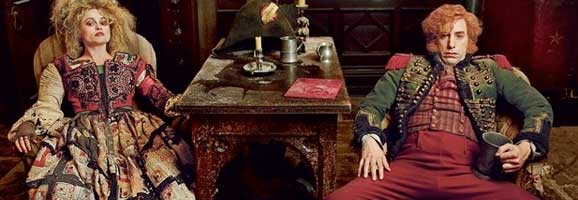Les Misérables: The Musical Versus The Film
Les Misérables is the latest musical adaptation to hit the theaters, but it is hardly the first. One of my favourite musical films is the 1956 The King And I, with the late Yul Brynner and late Deborah Kerr in the lead roles. There are many other musical films, but that subject alone deserves more discussion than I can afford here.
Before I go further, I must mention that I love watching musicals. And although tickets to watch a musical aren’t exorbitant (to me that is), they don’t come cheap either (especially if you want front row seats). So basically, you’re reading an article written by someone who would gladly watch the same musical twice, and even thrice, if she can afford the time and money to.
When you go to a musical, if you pay top dollar, you will likely be sitting close to the stage. That means you might be close enough to see the expressions of the performers. And if you get the cheaper tickets, you’ll be sitting further back. But that doesn’t mean you won’t enjoy the musical. Because when you sit further away from the stage, not only will you get to appreciate the detail and grandeur of the set, you won’t have to strain your neck to enjoy the performance during an ensemble piece as well.
Now why is all this relevant? Well, it’s because of the shooting style Tom Hooper applies to his Les Misérables.
In the musical film, because of the use of close ups, we are given the chance to be fully immersed in the story and be swept away by the performances of the actors. Tom Hooper’s Les Misérables gives us a view that the actual musical cannot, regardless of whether you are sitting in the front row of the musical or not. That is the first thing that struck me when I was comparing Tom Hooper’s film with the musical I watched years ago. And this suited me just fine because I’ve watched the musical before, twice in fact, so I know the plot and don’t need any wide shots or sweeping views to understand the setting of the story.

Now in order to explain the other differences between the film and the musical, I cannot avoid going into specifics and details, so if you have not seen the film and don’t like spoilers, well, you have been warned.
New Song

In the musical adaptation, Hugh Jackman’s Jean Valjean sings a new song titled ‘Suddenly’. The song is sung when Jean Valjean successfully rescues Cosette from the Thénardiers played by Sacha Baron Cohen and Helena Bonham Carter. And the song is about Jean Valjean discovering a new meaning to his life now that he has Cosette by his side. While I am not really a fan of this new song, I do understand why it was introduced to the film. The song gives the audience another chance to get to know Jean Valjean, especially since he’s supposedly a changed man. It also serves to inform the audience of Cosette’s importance to him.
Missing Song

The other songs sung in the film remain mostly the same. But the song ‘Dog Eats Dog’ sung by Thénardier does not appear in the film at all. Although, when Thénardier is searching dead bodies for valuables in the sewers, the tune of ‘Dog Eats Dog’ is still used. In fact, Sacha Baron Cohen’s Thénardier actually says the line – “Here’s a pretty ring”. And when he does, it sounds awfully similar to the version sung in the musical which goes “Here’s a tasty ring, pretty little thing…”.
Edited Songs
Some of the music is tweaked, with new lyrics added, to help advance the narrative. But the edited songs follow the same tunes used in the musical. So if you don’t closely examine both the musical and the film, you will not likely be able to tell the difference. For example when Gavroche introduces himself, singing to the tune of ‘Look Down’ in the film, his lyrics are slightly different from the one sung in the musical. In the musical he sings about the Thénardiers and Éponine. But in the film, he explains the situation in France instead.

The first interaction we see between Éponine and Marius in the film is also different from the one they have in the musical. In the musical, Éponine warns Marius to stay away as her parents and their gang get ready to con people of their money. But in the film, Éponine reveals in song that she knows Marius is only pretending to be poor and that his grandfather is rich. And in turn, Marius tells her that he has walked away from that life and the association with his grandfather. In my opinion, this change is for the better; it reveals more about Marius and of the relationship between Marius and Éponine to the audience than it does in the musical. It also makes our heart go out to Éponine even more when she sings the song ‘On My Own’ later in the film.
Song Sequence
Another difference is that a few songs in the film are shortened and appears at a different part of the plot as it does in the musical. In the musical, the song ‘Little People’, which is sung by Gavroche, lasts for nearly 2 minutes and 30 seconds. However, in the film, the song is greatly shortened and split into two parts. First when he exposes Javert, and later again when he goes out to get gunpowder. The song ‘On My Own’ also appears out of sequence. In the film, Éponine sings it after she warns Jean Valjean and Cosette about her father’s presence. In the musical, Éponine sings it after she delivers Marius’ letter to Cosette’s house.
Notable Differences
In the musical, it is Éponine who delivers Marius’ letter to Cosette. But in the film, Marius gets Gavroche to deliver the letter. The difference doesn’t just end there. In the musical, Éponine is offered money for delivering the letter and she later sings “I did not want your money Sir, I came out here cos I was told to…”. However, in the film, before Gavroche hands over the letter to Jean Valjean, he demands money from him. But this difference serves another purpose in the film. When Jean Valjean goes to the barricade, because it was Gavroche who delivered Marius’ letter, he recognises Jean Valjean and stops the revolutionaries from harming him.
The circumstances that resulted in Éponine getting shot is also different. In the musical, she is shot when she returns to the barricade after delivering Marius’ letter. But in the film, she saves Marius and takes a bullet meant for him.
The differences mentioned so far are mostly a result of the change in medium. A musical has limitations because of its set, as such the audience tends to be forgiving if there are gaps in the storytelling. However, in a film, the audience will question the logic and reasoning behind each action and interaction. Perhaps that is the reason why some plot points were changed in the film.
The last but most glaring difference between the film and the musical can be summed up as such – In the musical, the cast rely on their soulful voices to evoke an emotional response, so the acting is in the voice. But in Tom Hooper’s Les Misérables, the acting is both seen and heard, so in actual fact, the performances can have more impact due to the dual sensory experience film audiences get.
Sadly, not everyone was able to deliver the goods with regards to their singing. I must say though, that Anne Hathaway, Hugh Jackman, and Eddie Redmayne did a wonderful job in the film. In fact, Anne Hathaway’s ‘I Dreamed A Dream’ was my favourite scene in the film, followed by Eddie Redmayne’s ‘Empty Chairs At Empty Tables’. Their heart wrenching performances gave me an audio-visual experience that will stay with me for a very long time.

That being said, if you have never watched the musical, and it happens to be showing at a theatre near you, I recommend that you head on down to the box office and buy yourself a ticket. Tom Hooper’s Les Misérables is a great compliment to the musical itself. And besides, if you do watch the musical, you can see the differences between the musical and the film for yourself.
What do you think? Leave a comment.











That was very insightful, thank you. I’ve seen the movie but yet to get tickets for the musical.
Thanks. If you enjoyed the film, you’d probably like the musical. If a film is an adaptation, I always like to go back to the original material to see what the differences are between the two. I remember buying Victor Hugo’s Les Miserables to read after watching the musical for the first time in 1994.
Watch the musical, you won’t regret it!
This movie had one strong cast, we can’t deny that. ‘Little People’ was executed better in the original musical.
I absolutely agree with you, the original material is usually better than the adaptation. Although ‘Little People’ was greatly shortened, I’m glad to see it was included in the film.
Hey Mon! Great article! The differences you pointed out were very insightful. I’ve never seen the musical, so it’s interesting to see such a comparison. I thought Anne Hathaway gave a brilliant performance of that song too. Would you say that Gavroche had a bigger role in the film than the musical, or it’s just that he comes in at different parts? I thought his was a very interesting character and Daniel Huttlestone played him really well in the film!
Hey Pam! Thanks for your comment. I’m glad you found it insightful. I also think Daniel Huttlestone did a good job in the film. In regards to your question, I would say that Gavroche has a more significant role in the film than he does in the musical because his role was altered to become a pivotal one. Not only does he prevent Jean Valjean from being harmed when he goes to the barricade to look for Marius, when the revolutionaries felt disheartened, it was Gavroche who started singing ‘Do You Hear The People Sing’ which rallied them into action. Also, his increased role in the film allows the audience to make a connection with Gavroche so that when he gets shot, the revolutionaries and the audience are more incensed and affected.
If I remember correctly, in the novel, Gavroche is the one who delivers Marius’ letter to Valjean. So, some of these changes actually bring the film closer to the original novel, which is great!
Yes, Mike, you’re correct. In the novel, Gavroche is the one who is sent to deliver Marius’ letter.
Great article – I really enjoyed reading it. The paragraph regarding Eddie Redmayne, Hugh Jackman and Anne Hathaway is very similar to what I was going to say, so obviously I completely agree with your sentiments there. It was pleasant to see you offering opinions with your analysis also, so thanks!
(I also noticed there was already a positive review for the film, so decided not to post mine)
Thanks David, I’m glad you enjoyed reading it. I’m thinking of my next article already.
I hate to say it but I didn’t care too much for the film. My favorite songs were cut to pieces, I found some of the camera angles awkward and I suppose I was the only one who found Anne Hathaway’s singing to be grating. But I guess you can’t please everyone.
Nah! You’re probably not the only one who found Anne Hathaway’s singing to be grating. There will always be differing opinions and yes I agree, you can never please everyone. And as much as I enjoyed Tom Hooper’s Les Misérables, nothing beats the original musical.
The plot changes that you say were for the film are actually all in Victor Hugo’s original novel. These changes were made to honour the source material where the stage show uses artistic license (most likely for reasons of staging.)
Thanks for your comment Sam. Yes. They were indeed from the book, perhaps I should have mentioned it but it slipped my mind when I was comparing the musical and the film. But that is the beauty of different mediums.
Hi Monica
Your comparison was exactly what I was looking for as I sit and watch the movie again for about the 5th time. I have probably seen the musical the same amount of times. My father took me when I was 8 and it forever changed me. Regardless of the slight changes I think this film adaptation was incredibly well done, minus Russell Crow. The music and emotion arefelt both in the theater and on the big screen.
Thanks
Thank you Opal. I’m glad you enjoyed the article.
Actually I have to now add that Master of the House was WAY dissapointing in the movie. Thanks all. Happy Ny
You forgot the fact that Eponine isn’t with Fantine during the epilogue, it is the Bishop of Digne instead. This bit annoyed me because Eponine is my favourite character (plus Samantha Barks has one of the best performances in the film) and the more screen time she has, the better.
Just to clear up one of the differences. Gavroche is the one who delivers the letter in the novel.
The new song was not introduced for artistic reasons. It was added for the simple reason of being able to qualify for an Academy Award in original song. Every single modern adaption of a Broadway musical to film does this for the same reason.
that’s like your username being selected to collect the post-modern awards once those get on the move, way to stay ahead of the pack on your observant cynicism
always thought it was far more likely that nobody gives their weight in curds about awards, they’re just remnants of a stuffier time that mean nothing, except passing of speech-makers which get pulled off by elevator music anyway
and yea i know laurence olivier disagrees but what does he know 😛
Also, “I Dreamed a Dream” is supposed to come before “Lovely Ladies”, not after!
The movie follows the book plot more, so I would believe that the musical changed the story, not the film.
A little bit of this, a little bit of that.
Excellent article. There are several minor differences also, though.
For example, in the musical the Bishop of Digne sings “I have bought your soul for God” whereas in the movie he sings “I have saved your soul for God”. Personally I find the former more powerful.
Another interesting change: In the musical ‘I Dreamed a Dream’ was immediately after Fantine is fired, but in the Film this occurs after she has just become a prostitute & had her first customer. I felt the order was better justified in the film, it portrays her at her lowest point in life.
The biggest draw for me is that the film is sung-through, rather than lip-synced to recorded music. This puts the film and a live musical on more of an even plane. To me, it’s a little bit like the Met Opera Live in HD performances. You see live singing, and you’ve got the best seat in the house. Different, obviously, because the opera film is a continuous sequence, as is the live musical. But the Le Miz film is many live performances strung together in film. I enjoyed it immensely, and I admit singing is not Russell Crowe’s gift.